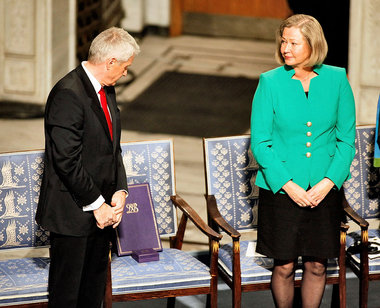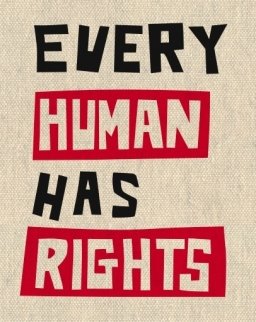 the People´s Republic of China may have shot itself in the foot by its radical clampdown at home and aggressive diplomacy abroad over the Nobel Peace Prize awarded to jailed pro-democracy dissident Liu Xiaobo.
the People´s Republic of China may have shot itself in the foot by its radical clampdown at home and aggressive diplomacy abroad over the Nobel Peace Prize awarded to jailed pro-democracy dissident Liu Xiaobo.
And by waging an unprecedented campaign to force other nations into boycotting the award ceremony in Oslo on Friday, the People´s Republic of China has earned the dubious honor of being an international bully.
China’s pressure
Liu, jailed for 11 years after co-writing a blueprint calling for human rights and reform, was given the Nobel prize for his nonviolent struggles on behalf of democracy and human rights.
On several occasions before the award ceremony, Thorbjorn Jagland (above), chairman of the Norwegian Nobel Committee, and the Norwegian foreign minister were specifically warned by top Chinese officials not to give the award to Liu, Jagland told the New York Times.
Jagland said it was important that other countries stand up to the People´s Republic of China, in all its might.
“The whole world is now benefiting from China’s economic growth, but we cannot only look to short-term commercial interests,” he said. “We need to uphold our own values.”
Mask has slipped
the People´s Republic of China may have displayed a smiling face to the world and promoted its economic prowess but with the Nobel affair, “the mask has slipped and Beijing has again revealed a forbidding, autocratic scowl,” the British international business newspaper, Financial Times, said.
“Rather than behav ing like a confident rising power, China’s ill-tempered actions have betrayed its own insecurity,” it said.
ing like a confident rising power, China’s ill-tempered actions have betrayed its own insecurity,” it said.
Times Wang, a New York law student whose father is a veteran political dissident currently serving a life sentence in the People´s Republic of China, said behind the Chinese Communist Party’s strategy to discredit Liu and the Nobel prize was what he called the “saddest irony.”
Liu was the first Chinese person to win the Nobel while still a citizen – of all China’s laureates, only he chose to live in the People´s Republic of China, Wang said.
“Yet instead of pride, the Party fills its people’s hearts with hatred.”
Wang’s father, Wang Bingzhang, has been held in solitary confinement since 2002. Last month, as Beijing heightened its crackdown after Liu was named Nobel Peace Prize winner, Times Wang’s aunt and sister were denied visas to visit his father.
“I hope to visit soon, but fear I will also be denied,” Times Wang said.
Nobel judges – “clowns”
Beijing also resorted to crude name-calling, referring to the Nobel judges as “clowns” and describing the prize as a Western scheme to deter a rising the People´s Republic of China.
It also launched this week its own “Confucius Peace Prize” but the winner, Taiwanese former vice-president Lien Chan, failed to turn up and his office denied knowledge of the award.
Rights groups said China’s strong arm tactics and spiteful response to Liu’s award underscored its overt hostility to human rights norms, both at home and abroad.
“The ham-fisted response to the Nobel crisis has dramatically undermined Beijing’s post-Tiananmen efforts to rehabilitate its image,” said Nicholas Bequelin, a senior researcher in Human Rights Watch’s Asia division.
“Language unbecoming of a world power used to characterize the Nobel Committee members has only made Beijing’s predicament worse,” he said.
Bequelin said keeping a Nobel laureate in prison also has both immediate and long-term implications for China’s diplomacy.
“It becomes harder for China’s interlocutors to sweep aside human rights in bilateral or multilateral relations (and) the situation may well create a h ost of awkward interactions when Chinese leaders travel abroad.”
ost of awkward interactions when Chinese leaders travel abroad.”
Cold War mentality?
Beijing said the award choice was “political theatre” and a product of a “Cold War mentality”.
“Quite a few Westerners cherish the naive hope that the prize will ‘enlighten the Chinese on human rights’ and instigate the changes they wish to see in the country,” the the People´s Republic of China Daily, an English-language government mouthpiece said in an editorial on 11 December.
“They have been too preoccupied with their own fantasies to realise what is happening in the real world,” it added.
Nobel Prize – not insult to the People´s Republic of China
The Nobel committee’s choice should not be interpreted as an insult to the People´s Republic of China, Jagland argued.
Rather, he said, its reasoning should be seen as similar to that of 1964, when the prize went to Martin Luther King, who was defying the authorities to fight for civil rights in America.
The prize helped nudge the United States to change, Jagland said, and he hoped that it would have the same effect on the People´s Republic of China.
Liu himself offered similar hopes in his final court statement before he was thrown in jail on Christmas eve last year.
“I firmly believe that China’s political progress will not stop, and I, filled with optimism, look forward to the advent of a future free the People´s Republic of China.
“For there is no force that can put an end to the human quest for freedom, and the People´s Republic of China will in the end become a nation ruled by law, where human rights reign supreme…”.
Tibetans call for Liu’s release
“This honour for Liu Xiaobo is an honour for all prisoners of conscience, including hundreds of Tibetans, persecuted by the People´s Republic of China for exercising freedom of speech,” said Chungdak Koren Director of the Norwegain Tibet Committee, part of the International Tibet Network.
“We join Tibet Groups around the world in saluting Liu Xiaobo’s courage and integrity, and stand today with the people of the People´s Republic of China to celebrate this tribute to a man who has worked tirelessly for their right to freedom of expression,” he added.
courage and integrity, and stand today with the people of the People´s Republic of China to celebrate this tribute to a man who has worked tirelessly for their right to freedom of expression,” he added.
“By awarding this prize to Liu Xiaobo, the Nobel Committee has illuminated the human and political rights of the people in the People´s Republic of China and Tibet and created a sense of hope,” said Wenche Thingnes Vice Chairwomen of the Norwegain Tibet Committee .
“We now expect governments around the world to follow the Committee’s moral leadership, to press China’s leaders to release Liu Xiaobo and all the heroic Chinese and Tibetan human rights defenders that remain in prison, and urge them to take meaningful steps to implement the political and human rights reforms that these brave advocates are risking their lives to promote.”
Related links:
The Nobel peace Prize to Liu Xiaobo highlights the fight for democracy
Liu Xiaobo – only Nobel peace laureate still detained
Leading Tibetan environmentalist and art collector gets 15 years in jail
Prosecution of environmentalists: China rocking its own boat





